10 Types of Pillows — The Fillings You Need to Know, and How to Pick the Right One for You
Finding the perfect pillow can be a gamechanger for improving your sleep. Read on to explore our breakdown of the best suggestions — all in the name of a good night’s rest
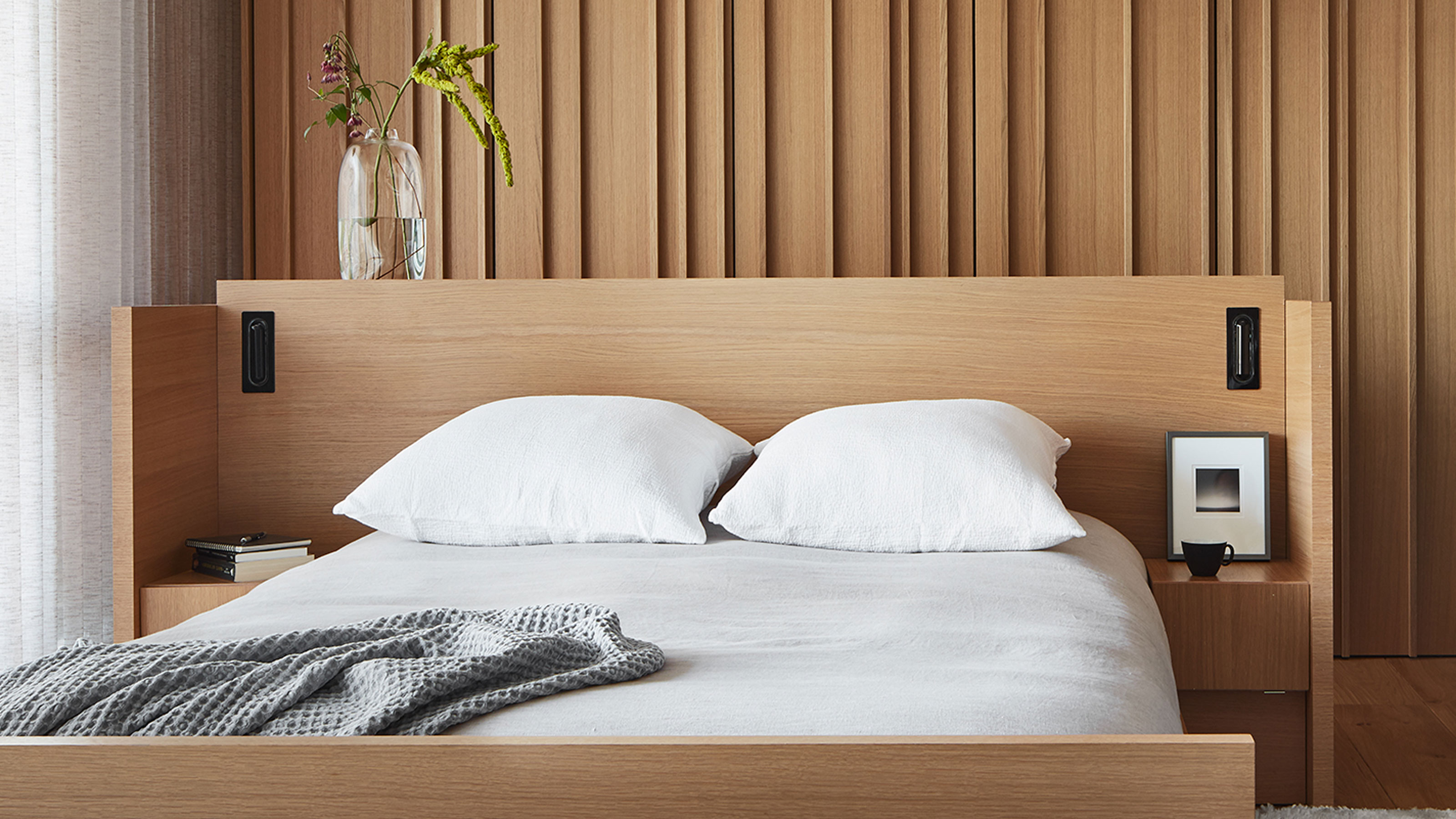

There's a lot of information out there to make sense of when choosing new pillows for your bed, so you'll want to understand what makes the perfect pillow and discover how your individual pillow needs suits your own body specifically.
The many and various types of pillow may have you feeling a little confused, so we rounded up the materials and fills you need to know about when making your decision, along with some recommendations from some of the best bedding brands around.
These are the types of pillow to know, and whether they're the right choice for you as a sleeper.
What to look for in a type of pillow
When choosing a pillow, to reach the best outcome, there are three factors that need consideration.
Dr. Shelby Harris, Director of Sleep Health at Sleepopolis explains, ‘When choosing a pillow, consider the material it’s made of, how firm it is, and its height. Make sure it supports your head and neck to keep your spine aligned.’
Plus, like anything else, it’s always worth checking the washing instructions, breathability, and whether it’s hypoallergenic if applicable. If you can tick all of those boxes, you should be in for a flawless snooze.
1. Goose and duck down pillows (including synthetic and mixed down)
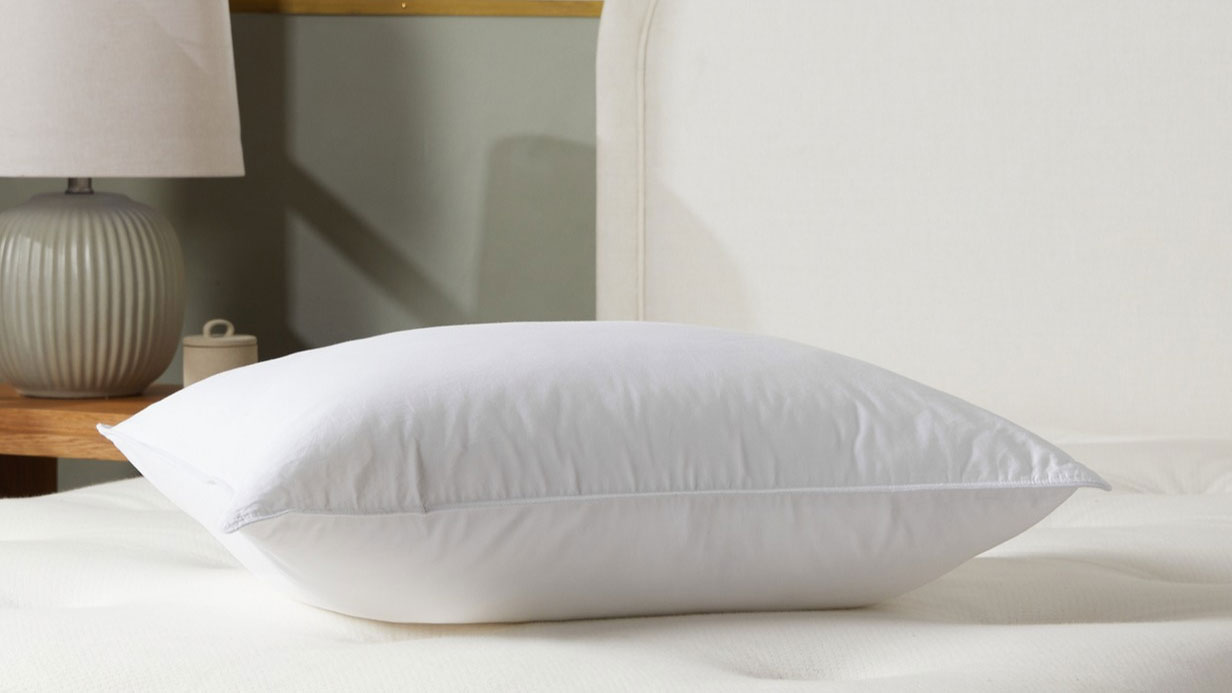
Best for: Side sleepers and back sleepers.
Down is the soft layer of feathers underneath a bird's exterior feathers. Goose down is the softer option offering larger clusters and providing more warmth. However, duck down is the more affordable of the two, still offering ample insulation and comfort.
Synthetic down is a good option in terms of cost and allergy risks. Recycled down is another option, both luxurious and eco-friendly for peace of mind. On the whole, a down pillow is the luxury choice, so yes, they do tend to cost more, but they will last you for years to come.
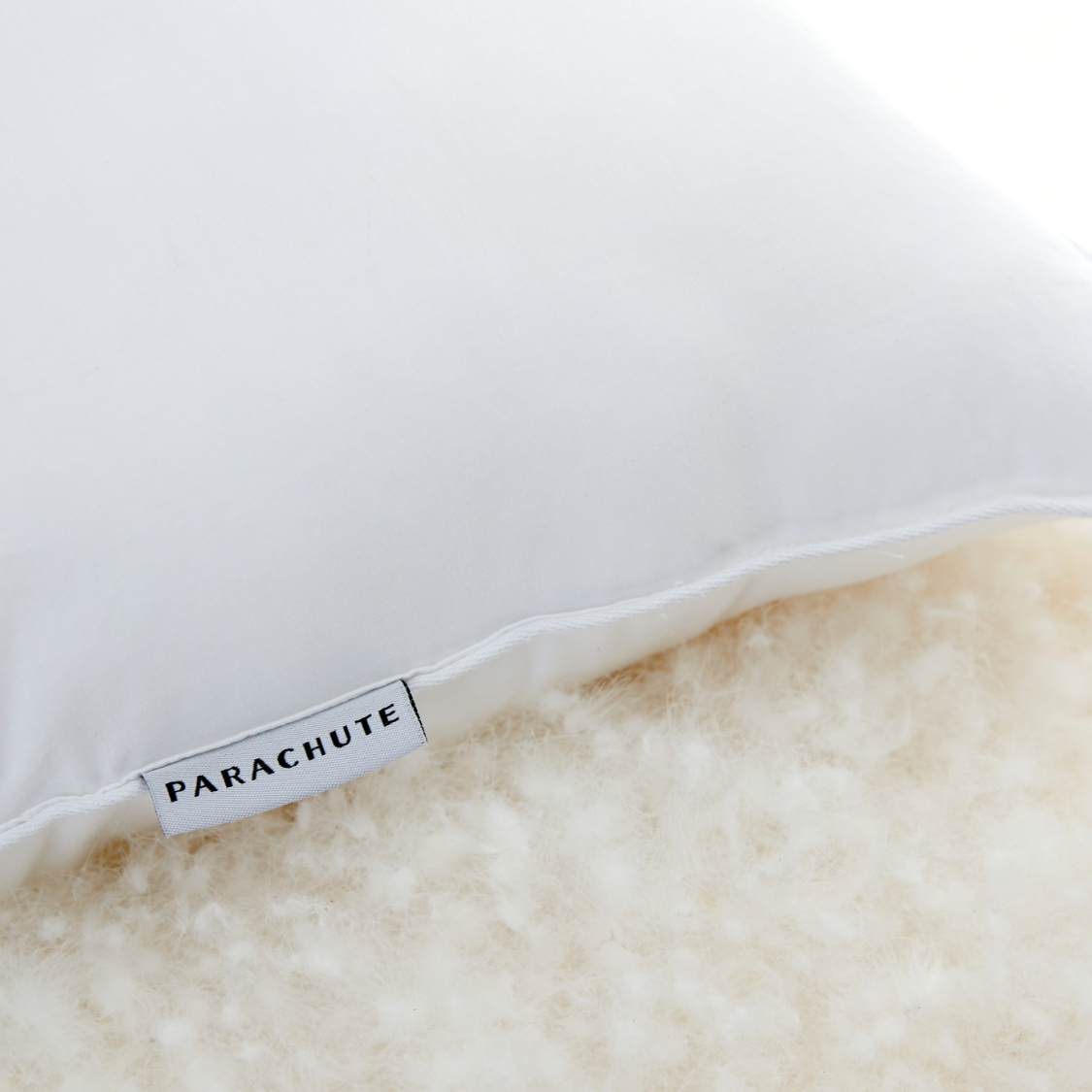
Price: $130-$210
This down pillow from Parachute has over 1,300 5 star reviews, and is loved for its comfort by reviewers. You can choose the level of firmness, too, so you can tailor it to your preferences.
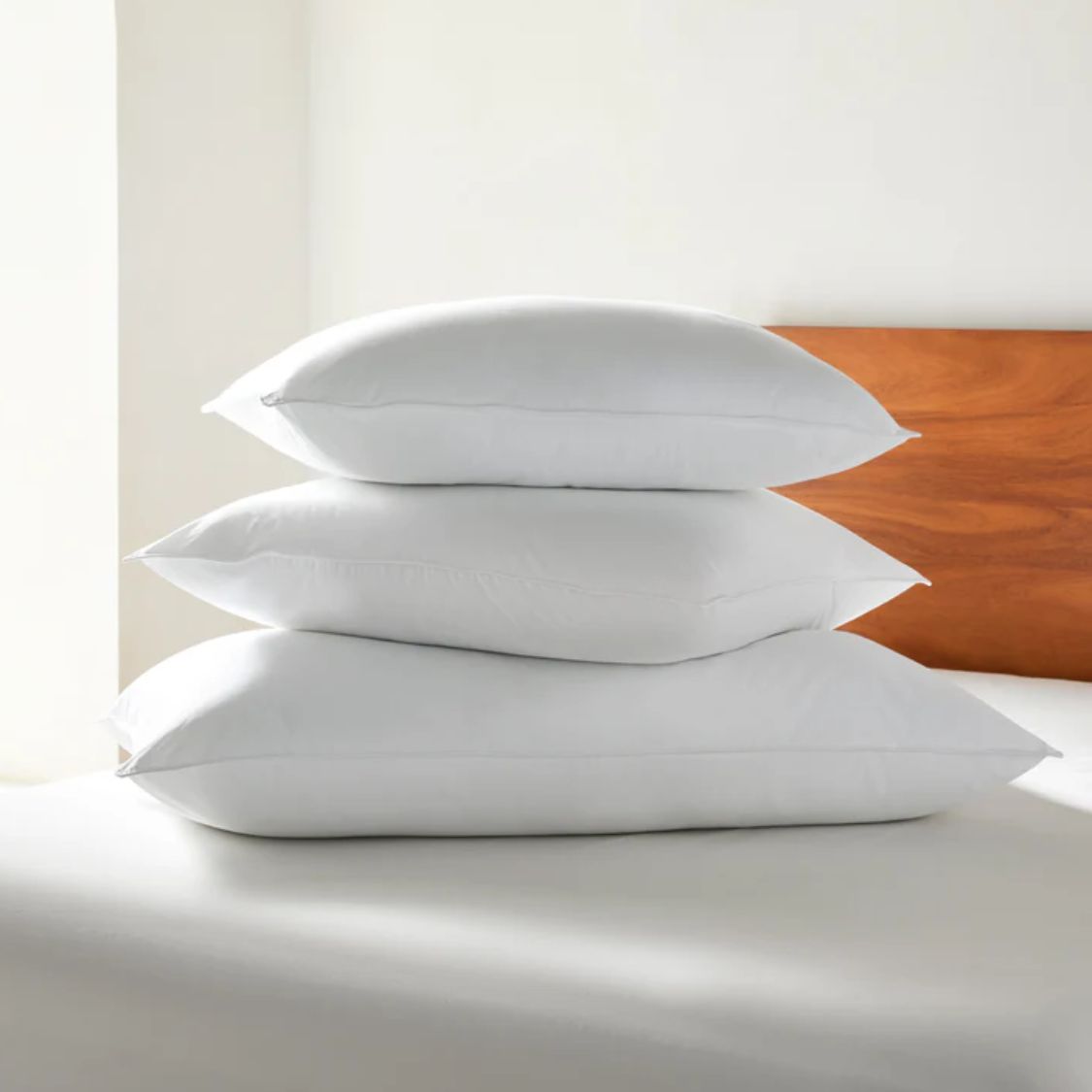
Price: $65
For those who don't agree with animal down, this vegan alternative is the way forward. With an average star rating of 4.5 out of 5, and a budget-friendly price tag compared to real down, this is luxury with a conscience
Pros:
- Soft, cozy and lightweight
- Molds to the shape of your head and neck
- Mixed down pillows have extra support because of the feathers within
- Good insulation
- Synthetic down pillows are great for allergy sufferers and usually easier to care for
- Longevity. They should last for years to come!
Cons:
- Cost
- Risk of allergies
- New pillows may have a noticeable scent
- May require regular fluffing and professional cleaning
2. Feather pillows
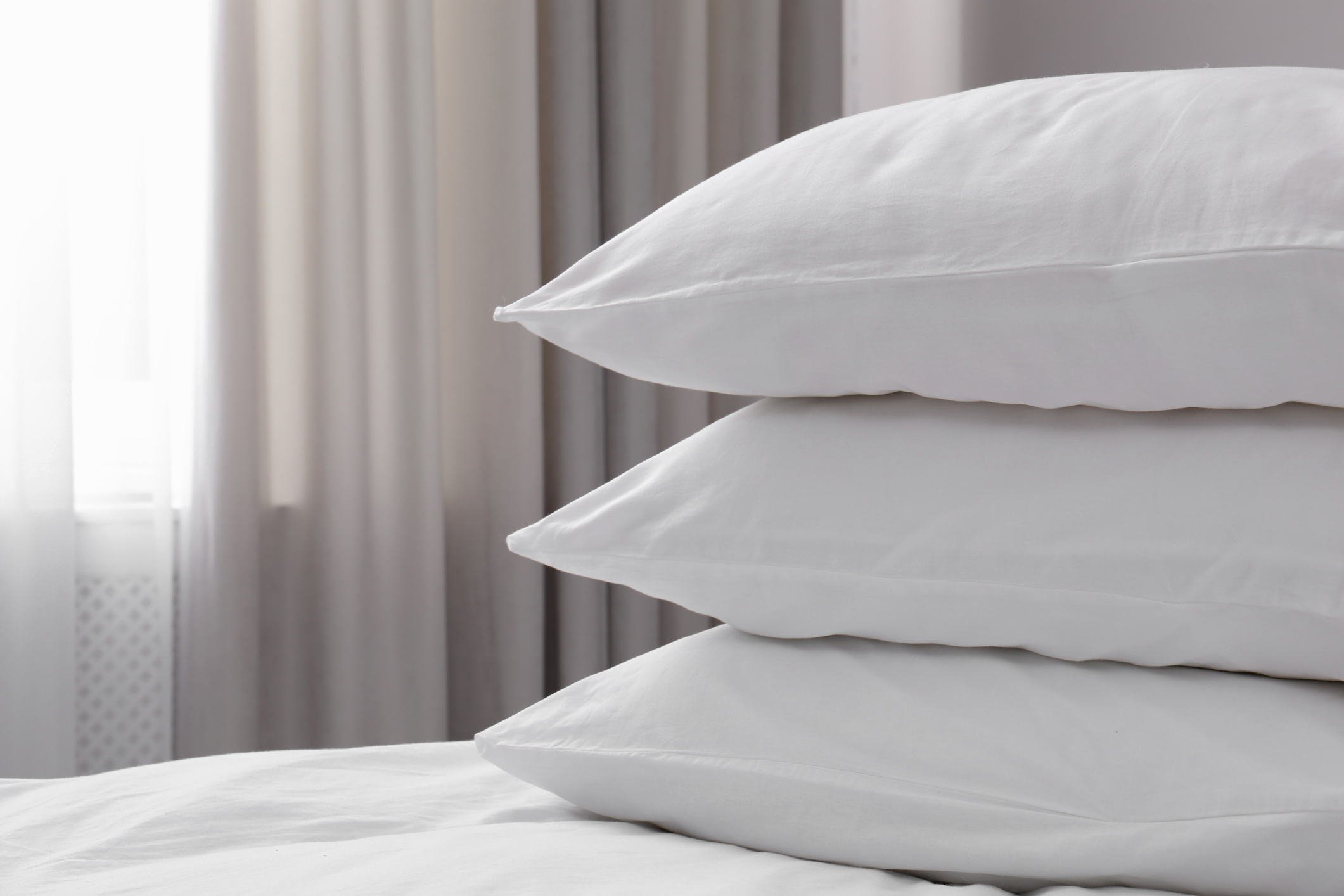
Best for: Side sleepers and back sleepers
A feather pillow contains the back and wing feathers of birds such as ducks or geese. These feathers are flatter than down with a distinct quill. The quill is what can cause that spiky feeling in a pillow, so it's often viewed as inferior to down, but a higher-quality shell should encase the fill, preventing this. Most feather pillows also contain some down for loft.
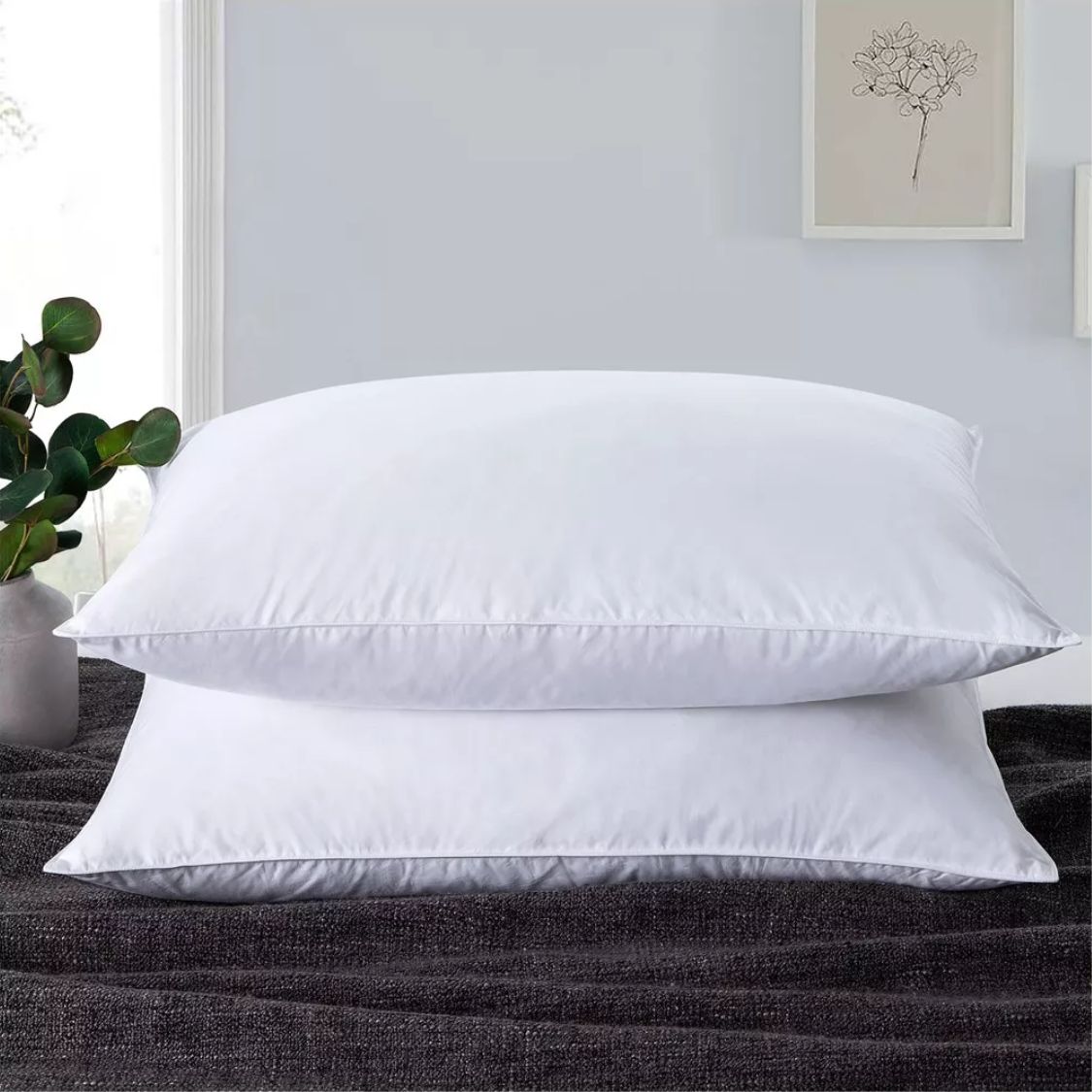
Price: $39.59, Was: $65.99
While this set of feather pillows only has a few reviews on Target, across other sites, you'll find there is over 1,000 5 star reviews. However, some reviews do say the feathers can part leaving them with gaps after using them for a while.
Pros:
- Molds to shape of your head and neck
- Firmer support which is good for neck alignment
- They help you stay cool at night due to good breathability
- Cheaper than down
Cons:
- Feather quills can sometimes poke through
- They tend to flatten faster than down
- Can be noisy
- They could have a natural odor when new or when damp
3. Cotton fill pillows
Best for: Back sleepers and side sleepers.
Cotton pillows are a popular choice, filled with naturally grown cotton, it’s ideal for allergy sufferers. The cotton fiber breathes better than synthetic filling and so feels cooler against the skin.
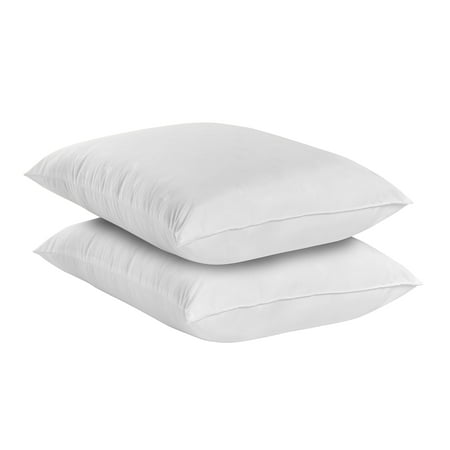
Price: $17.99
Budget-friendly, and with plenty of great reviews, these cotton fill pillows are a good hypoallergenic choice. Some reviewers say they're more medium, than they are soft, which is worth keeping in mind.
Pros:
- Hypoallergenic
- They are very breathable, great for keeping hot sleepers cool
- Easy to care for and usually machine washable
- Affordable
Cons:
- Some people may find them too firm
- May not provide enough support for all sleepers
- Needs to be washed frequently due to moisture absorption
- Can become lumpy
4. Latex pillows
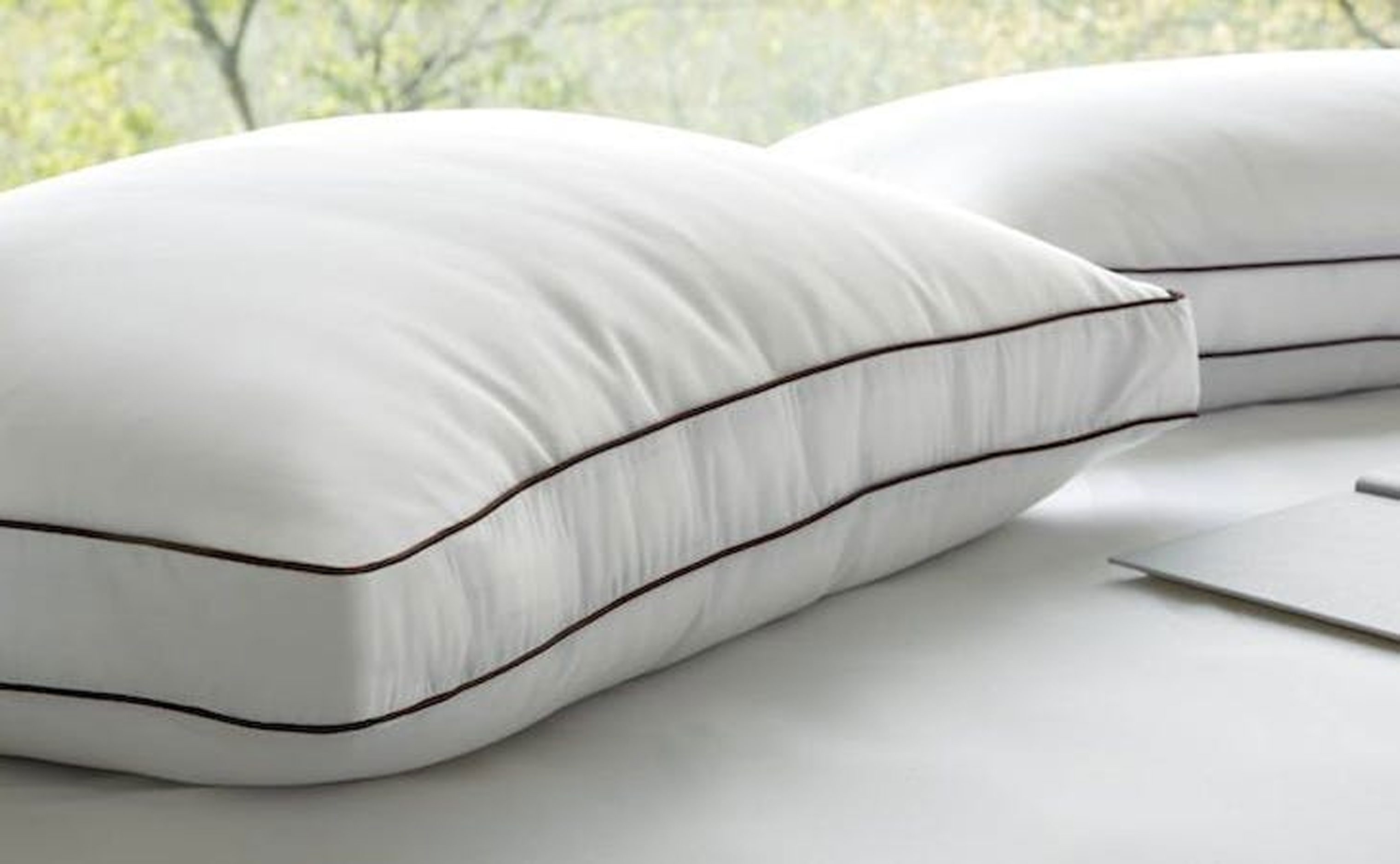
Best for: Back sleepers and side sleepers.
Made from layers of natural latex foam, this filler will balance support and comfort for the body. The open cell structure makes for good airflow for hot sleepers.
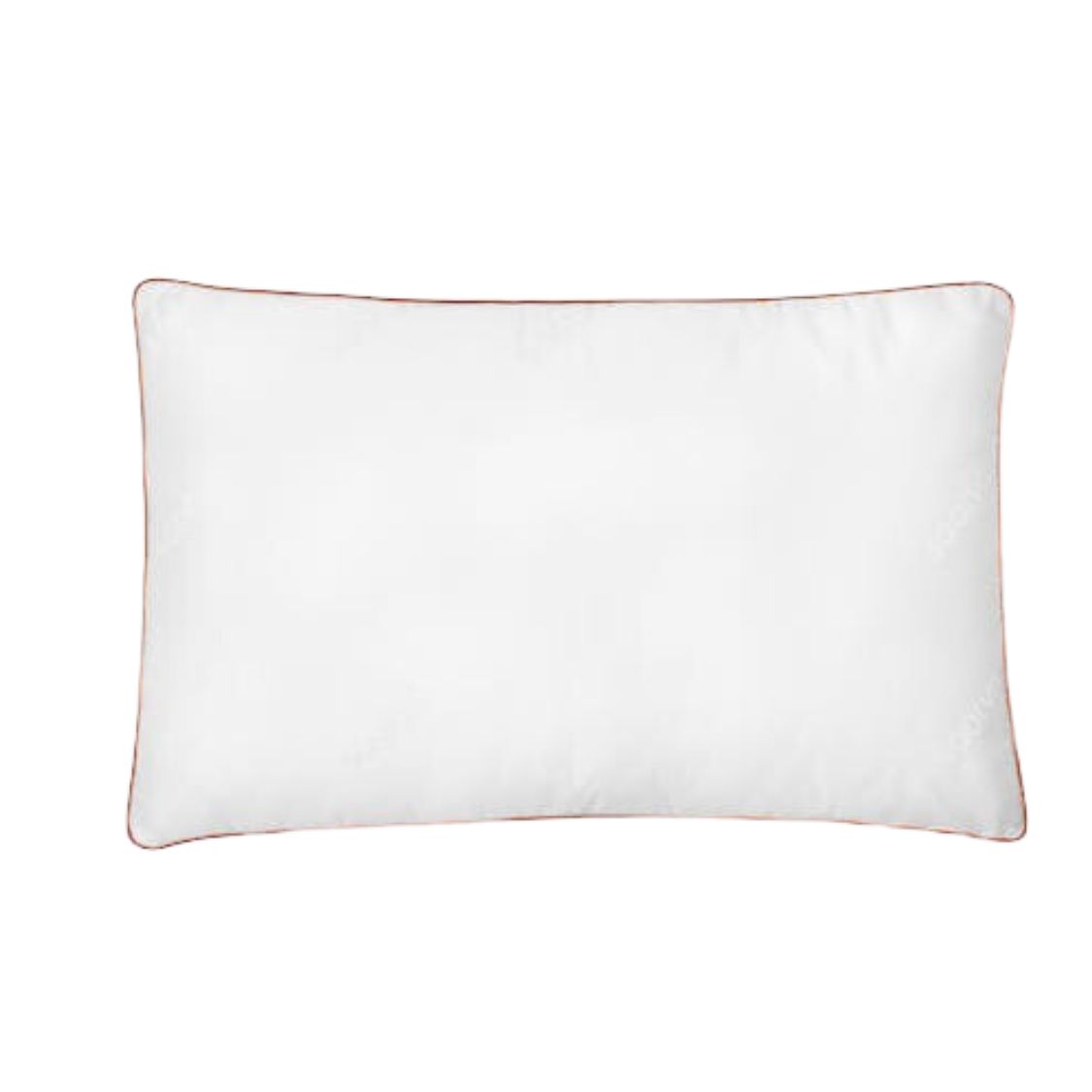
Price: $165
Luxury bedding brand Saatva has a pillow with a shredded latex core that makes it responsive to your head and neck. It's got great reviews, especially from people with shoulder pain and arthritis, among other ails.
Pros:
- Keeps its shape well and provides consistent support
- Resistant to mold and dust mites which makes it a great choice for allergy sufferers
- Longevity
Cons:
- Generally more expensive
- Heavier than other types of pillows
- Less adaptable to the shape of your head compared to other options
5. Memory foam/shredded memory foam
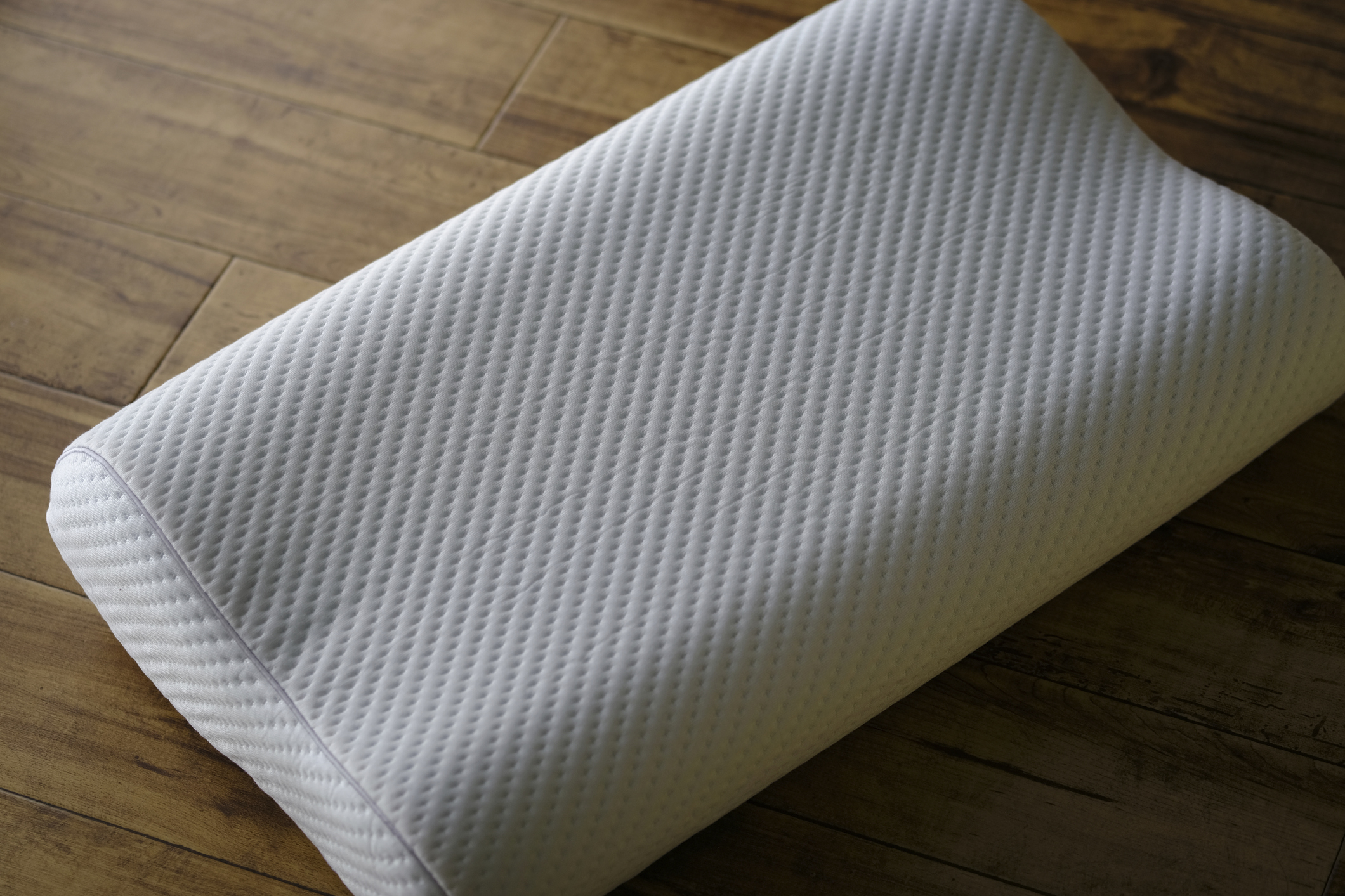
Best for: Side sleepers and back sleepers
The usual memory foam pillow will compress as you lay your head down, conforming to the exact shape you create through pressure. When you release pressure, the pillow resets itself back to its original shape. Shredded memory foam is as the name implies, tiny shredded pieces of foam, allowing the pillow to be squashed into any shape or form and entirely moldable.
Pros:
- Has great contouring ability and molds well to your head and neck shape
- Excellent support for great spinal alignment and reducing neck pain
- Shredded memory foam lets you adjust its firmness to your liking
Cons:
- Can retain heat, making them uncomfortable for hot sleepers
- Might have a chemical-like odor initially
- Generally heavier, which could make adjusting it during sleep more difficult
6. Polyester fill
Best for: Back sleepers.
Polyester pillows are affordable, hypoallergenic, and easy to care for. However, they do tend to have a shorter lifespan and may flatten out quite quickly, meaning you’ll have to replace them more often. They offer less support which can lead to neck pain for certain sleeping positions, and they tend to retain heat which is tough for hot sleepers.
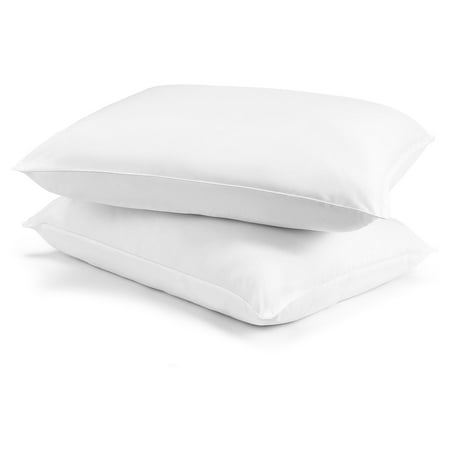
Price: $17.98
Microfiber pillows are inexpensive, and a good hypoallergenic choice. They've got predominantly good reviews online, and the Mainstays brand is one you'll probably you'd recognize shopping at many big stores.
Pros:
- Affordable pricepoint on pillows
- Hypoallergenic option
- Easy to clean, usually machine-washable
- Lightweight
Cons:
- Less durable than natural materals
- Can flatten quickly
- Not as supportive
6. Bamboo fill
Best for: Side sleepers, back sleepers, and hot sleepers.
A sustainable choice due to their eco-friendly bamboo fibers, this type of pillow is great for allergy sufferers and ideal for hot sleepers. However, the quality of bamboo pillows can vary so be sure to try before you buy.
![Memory Foam Bamboo Pillows King Size Set of 2 [adjustable] for Sleeping - Cool & Breathable Cover With Zipper Rayon Derived From Bamboo Pilllowcase - Relieves Neck Pain - Back/stomach/side Sleeper](https://cdn.mos.cms.futurecdn.net/gqHZ4Z3ZvMBLgETfog4L7h.jpg)
Price: $54.99
Reviewers love these "surprisingly good" bamboo pillows from Amazon for their comfort and breathability. They say it takes a while to adjust to your head, but before long you'll be enjoying them.
Pros
- Eco-friendly alternative to both down and feather, and manmade materials
- Breathable so transfers moisture and air circulates
- More absorbent than synthetic materials
- Anti-microbial, so last longer
Cons
- Inside of pillow can't be washed, just the cover
- Heavier material filling
- May take longer to adjust to
7. Buckwheat
Best for: Side sleepers and back sleepers.
Buckwheat pillows allow you to adjust the fill for customized comfort. They are very durable and made from natural materials, making them an eco-friendly option. However, the filling can be noisy, and could disturb light sleepers.
Pros:
- Excellent support
- Fill can usually be adjusted
- Breathable filling
- Hypoallergenic
Cons:
- Heavier compared to similar fillings
- Can be noisy when moving on pillow
- May be too firm for some
8. Gel pillow
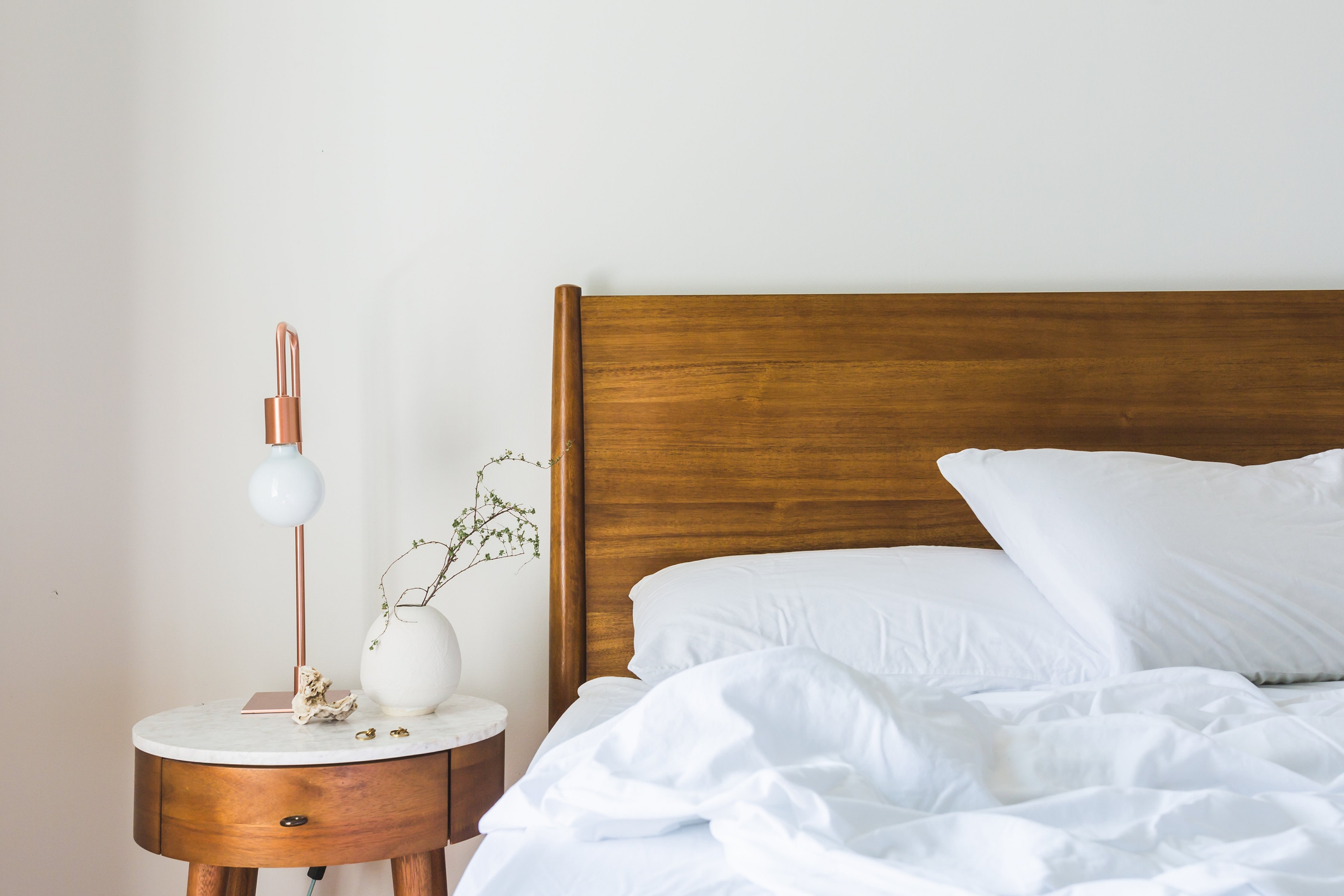
Best for: Side sleepers, back sleepers, and hot sleepers.
Gel pillows are great for those who overheat at night because they help dissipate body heat. They provide good support which assists with spinal alignment, maintaining their shape over time.
Pros:
- Cooling effect
- Good support
- Maintains shape
Cons:
- Can be expensive
- May be too firm for some
9. Kapok
Best for: Side sleepers and back sleepers.
Kapok pillows are extremely soft, similar to down, but are cruelty-free. The fibers are sourced from the Kapok tree seed pods - organic, natural and hypoallergenic, making these pillows a healthy choice.
Pros:
- Silk-like softness
- Lightweight
- Hypoallergenic
- Eco-friendly
Cons:
- Less supportive compared to foam or latex
- Can be expensive
10. Orthopedic
Best for: Back sleepers and those with neck or back pain.
Orthopedic pillows support proper spinal alignment, providing relief from back and neck pain. They come in various shapes and sizes meaning you’re able to suit your individual requirements. They can be an adjustment to get used to and are generally more expensive because of their specialized design.
Pros:
- Excellent support
- Designed for proper alignment and pain relief
Cons:
- Firmness varies
- Can be expensive
How do you choose the right type of pillow for yourself?
To make the right choice, think about your main sleeping position and your preference in terms of firmness and material. Dr Shelby suggests, ‘If you can, try before you buy,’ and be sure to consider any specific needs like allergies.
‘Filling and materials determine a pillow’s comfort and support. Each pillow type has its pros and cons, and some are better suited to certain body types and sleep styles than others,’ says Dr. Michael Breus, Clinical Sleep specialist at Sleep Doctor.
This is such a personal decision, you’ll need to weigh up your options taking into account your essential requirements and any preferences you may have but there is definitely something out there for everybody!
What type of pillows are used in 5 star hotels?
Even though personal preference is, of course vital to consider, lifestyle and travel editor Gilda Bruno looked to the experts and discovered most 5 star hotels consider goose down pillows the ultimate solution to guarantee their guests an outstanding sleeping experience. 'This is mainly due to the high quality of their filling which, composed of the soft inner layer of goose feathers, ensures long-term comfort and adaptability for all sleep positions and body types.'
With their ability to trap the heat, goose down pillows make an ideal addition to your bedroom in the colder months, 'When paired with premium cotton cases with a high thread count, they also meet the levels of firmness, dryness and temperature regulation required to rest well throughout the summer,' Gilda continues, 'With their fully natural and biodegradable structure gently conforming to every head shape, buckwheat pillows make a perfect cruelty-free alternative to down-filled sleeping supports.'
Be The First To Know
The Livingetc newsletters are your inside source for what’s shaping interiors now - and what’s next. Discover trend forecasts, smart style ideas, and curated shopping inspiration that brings design to life. Subscribe today and stay ahead of the curve.

Portia Carroll is an interior stylist, writer, and design consultant. With a background in interior architecture and design, she has a plethora of creative experience in the industry working with high end interior brands to capture beautiful spaces and products and enhance their qualities.
-
 How Much Does an Extension Cost in 2025? Renovation and Design Experts Break Down Your Budget
How Much Does an Extension Cost in 2025? Renovation and Design Experts Break Down Your BudgetExplore how much different types of extensions cost in 2025 to budget for your project accurately
By Amy Reeves Published
-
 8 Blue And Orange Living Room Ideas Where "Enveloping And Transformative" Is the Mood
8 Blue And Orange Living Room Ideas Where "Enveloping And Transformative" Is the MoodA blue and orange scheme for living rooms may sound jarring, but these spaces prove they're striking, vibrant, and certainly unforgettable
By Camille Dubuis-Welch Published
